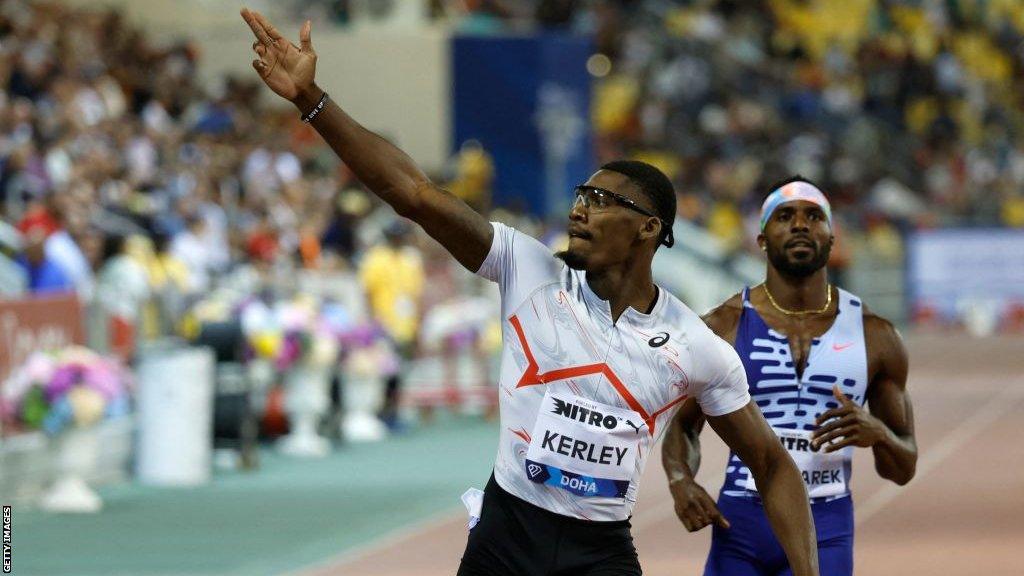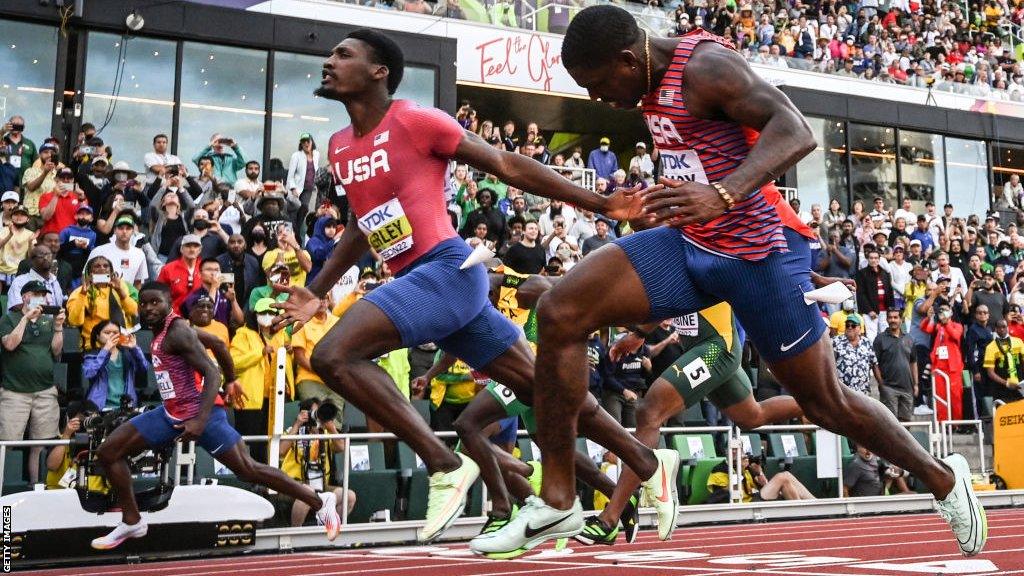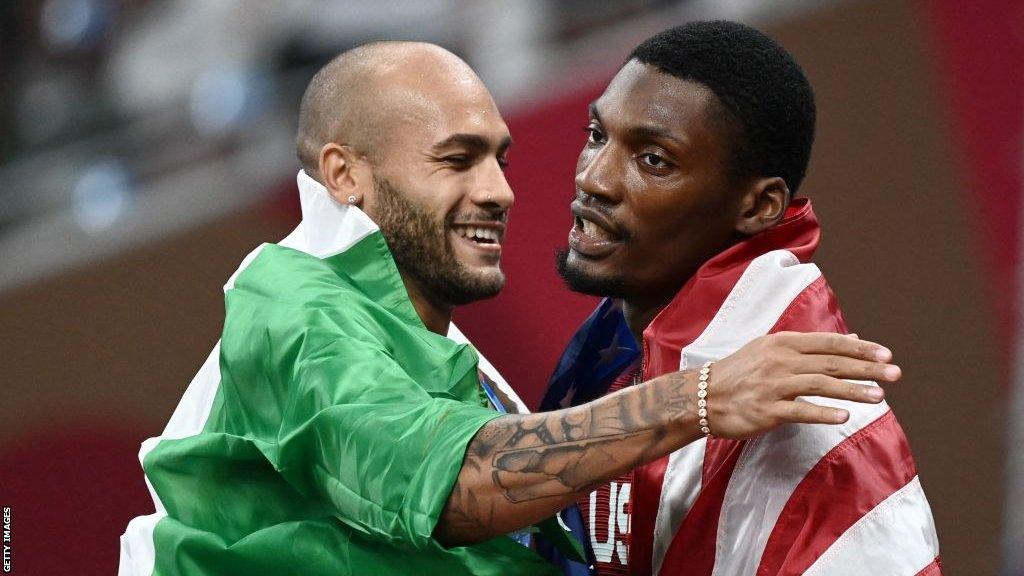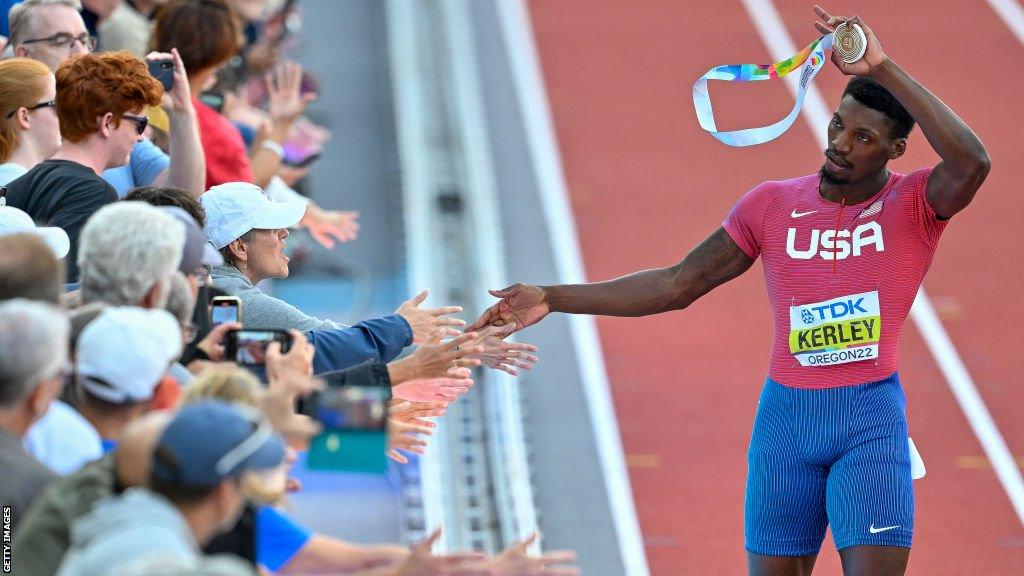Fred Kerley: World 100m champion on aiming for double gold, Lamont Marcell Jacobs and athletics' future
- Published

Fred Kerley is one of only three men to run under 10, 20 and 44 seconds for the 100m, 200m and 400m respectively - along with Michael Norman and Wayde van Niekerk
It's not how you start, it's how you finish.
That was certainly true when Fred Kerley chased down the field to claim victory over 200m in last week's Diamond League opener in Doha.
It also epitomises the world 100m champion's personal story.
By his own admission, the 27-year-old's childhood was "rough".
Adopted by his Auntie, Kerley grew up in the small city of Taylor, near Austin, Texas, in a house with 13 children living under one roof.
"I have always been running for something bigger than myself," Kerley tells BBC Sport.
"Each and every day is a blessing. I know I need to work, and work, and work, no matter what."
It is that mindset which ensured he could overcome his humble beginnings and reach the top step of a global podium.
"I don't want anyone in my household having to worry about where the next meal is coming from, like I did," Kerley says.
"I know in my footsteps right now people have my background but they don't have no outlet for themselves."
He adds: "Hopefully I can be an example that you can keep on going no matter what."
Kerley embodied that in a literal sense in Eugene last summer, when he led an American clean sweep of the men's 100m medals on home soil to win his first individual global title.
He did so despite running with an injury - although that issue ultimately ended his hopes of a repeat success in the 200m.
But this year, in Budapest, he will seek to achieve that individual world sprint double - a feat he believes would raise his status in the sport to another level.

The men's 100m at the 2022 World Championships was the first time a nation had won all three medals in the event since the USA did so in 1991
"The most important thing for me is double gold," says Kerley, not yet allowing thoughts of Paris 2024 to enter his mind.
"Staying healthy will be the key to success. Track and field can be overwhelming sometimes," he adds, emphasising the importance of both his physical and mental wellbeing.
"It would put me up there with some elite athletes."
One man who will hope to deny Kerley in his quest for gold is Lamont Marcell Jacobs, Italy's surprise Olympic 100m champion.
Kerley had to settle for silver by four hundredths of a second on his major championship debut at the Tokyo Games, before upgrading his medal in the absence of the injured Jacobs at last year's Worlds.
Set for a fascinating battle for global supremacy in August, recent social media exchanges have fuelled excitement of a burgeoning rivalry, with Kerley challenging Jacobs to an unprecedented one-on-one race but adding he did not know if his rival would "show up".
Jacobs responded on Instagram with a picture of his Olympic victory, accompanied by the words: "Whenever you want, wherever you want. But remember that when it mattered more it ended like this."
It has since been announced that Kerley will have his opportunity to compete against Jacobs at two upcoming Diamond League meets - in Rabat on 28 May and Florence on 2 June.
"As a human being, I give the guy all my respect," says Kerley, discussing his feelings towards Jacobs.
"As a track athlete, I'm competitive and I'm ready to compete on any given day.
"This is what we do for a living. I know what I'm capable of doing. I'm here to compete and get my name out there for bigger things."
He adds: "One-on-one stuff would be good for the sport."

Lamont Marcell Jacobs clocked 9.80 seconds to beat Fred Kerley to the Olympic 100m title
The idea of a head-to-head contest is in part driven by Kerley's vision of what the future of the sport could look like.
The enormous success of Formula 1's behind-the-scenes Netflix series Drive to Survive, familiarising the audience with the sport's personalities, has offered a blueprint for success as athletics seeks to appeal to a global audience with changing demands - in a bid to attract a loyal, year-round following.
"It's getting the revenue to do it," says Kerley. "We could be an F1, I would say. [A Netflix-style series] would definitely be beneficial to the sport itself.
"People that don't follow athletics, they just tune in for the Olympic Games.
"We are bigger than the Olympic Games. The NBA has the Championships, the NFL has the Super Bowl. We do more stuff outside the Olympic Games that deserves more recognition.
"Everyone in the world don't know who I am - but everybody knows who LeBron James is.
"To grow our names and grow the sport you have to step outside of the norm that we've been doing for years and years, getting the same results."

Fred Kerley's personal best of 9.76 seconds is the joint-sixth fastest 100m in history
When Kerley is not having to think about training and competing, it is time spent gardening which brings the world champion serenity.
Indeed, a key lesson that has underpinned the American's rise to global stardom is one which he says is central to that particular pastime.
"It shows you nothing comes overnight, just like in track and field," Kerley says.
"You've got to work; you have to make sure you water it.
"You have to do all these little things which lead to something bigger."
Equally, Kerley says, gardening simply helps take his mind off the "stress" of his sporting endeavours.
Welcoming comparisons to Usain Bolt, given his background as a former world bronze medal-winning 400m runner, Kerley has no doubts about his ability to achieve his grand targets.
Emboldened by the thrill of his breakthrough triumph on home soil, Kerley - only the third man in history to run under 10, 20 and 44 seconds for the 100m, 200m and 400m respectively - will aim to emulate Bolt by becoming the first man to complete a world sprint double since the Jamaican in 2015.
And for Kerley, it really is all about the medals.
"Medals last forever, times come and go," Kerley says.
"On any given day a time can be broken. Medals last for generations to come.
"If I stay healthy anything is possible for me. Along with running fast and winning medals, it's the most important thing."